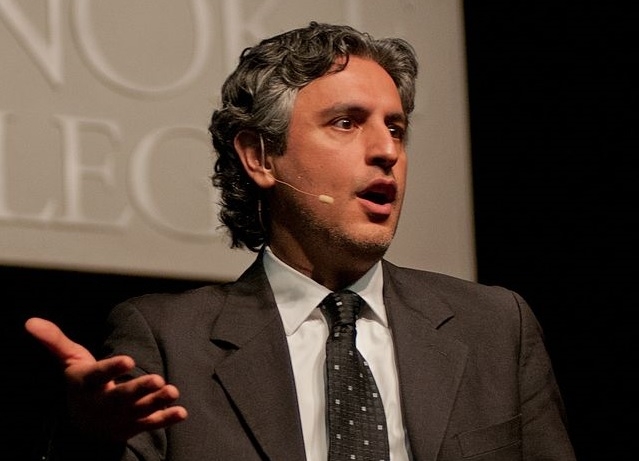Reza Aslan - a poster boy for the new meta-faith

Reza Aslan stands on a stage in Vancouver, dwarfed by a giant image of Jesus Christ. There’s something of the slick televangelist in his pitch perfect delivery, and flawless PowerPoint presentation on his new book Zealot: the Life and Times of Jesus of Nazareth.
And yet when he speaks, notes an Israeli woman beside me, he sounds like a New York Jew.
Indeed Aslan is an intriguing hybrid- part academic/part showman, an immigrant kid who fled Revolutionary Iran to settle in California and became a teenage evangelical, only to find his way back eventually to Islam, while still claiming that “Jesus is my hero.” His style is more storyteller than academic, but his media profile was augmented exponentially by an unfortunate interview on Fox News last year, when hapless anchor Lauren Green questioned his right as a Muslim to write about Jesus and he responded with a slew of scholarly credentials. Soon his book was #1 one on the best seller lists.
Aslan, who has a pad in the Hollywood Hills, regularly holds forth at celebrity dinner parties and runs a small media empire focused on the Middle East, has become the go to guy for the friendly face of Islam; a man who attempts to remedy Western stereotypes about the Muslim world but put a hopeful spin on the US invasion of Iraq by cheering its nascent “Islamic democracy.” He is a chimera for our time, and, one might add, a natural choice for a new CNN television program on religion. But, as some scholars argue, he may not be the most qualified person to write about the historical Jesus. His focus on Jesus as a predecessor to the zealots, a group of 1st century Jews dedicated to violent rebellion against Roman rule, has raised eyebrows in some academic circles.
While his central thesis – namely that the historical Jesus was a revolutionary executed by Rome for sedition and part of a long tradition of national liberation movements in the Galilee – not the supernatural “Christ” invented by Paul- is not new – neither is the debate about who Jesus really was or what his teachings were. And some Aslan supporters have put down criticism of his work to academic jealousy at his popular success.
Writing in Christianity Today, Craig A Evans notes that Aslan’s “proto-Zealot” version of Jesus was best presented by British scholar S G F Brandon in 1967, then says dismissively, “Few followed Brandon then; virtually no one does today.”
Allan Nadler’s critique in the Jewish Review of Books takes issue with many of Aslan’s assertions about Judaism and Christianity, and goes as far as to suggest – just as the Fox news anchor did- an actual hidden “Muslim agenda.”
While not technically a Biblical historian or a secret Islamist (Zealot’s narrative of Jesus is anti-thetical to the Muslim one and he oddly omits any mention of the veneration of Jesus in Islam) Aslan is a professor of creative writing, and his book depicting Jesus as a firebrand political revolutionary is a good read, full of dramatic twists and turns.
His examination of the early church’s attempt to diminish the power of James and John the Baptist offers a certain intrigue. And his highlighting of the tensions between the Judean priestly class and the Galilean peasants as well as the early disciples of Jesus who remained essentially a Jewish sect and the apostle Paul who sought to banish the “law of Moses,” speaks to his PhD in the sociology of religions.
It’s not surprising that the book – which reads in places as Jesus Christ Superstar meets Cecil B DeMille and has lots of current regional resonance in its descriptions of a violent, occupied 1st century Palestine as a place of “client kings”, wandering apocalyptic messiahs and a huge gap between rich and poor- will be become a film produced by David Heyman of Harry Potter fame. The media savvy Aslan, even describes a biblical scene in one chapter with a reference to actions happening “off-screen.”
When I ask Aslan how he feels about his book being turned into a Hollywood movie, he doesn’t miss a pithy beat. “I’m excited that they’re doing a gay, cowboy Jesus film,” he deadpans.
But after all is said and done, I find myself more intrigued by Aslan’s own story. Indeed I see a screenplay unfolding….an American-Iranian version of Hanif Kureishi’s Buddha of Suburbia perhaps. A young boy arrives from Tehran in early 80’s America and encounters a Reagan era California of salesmen and evangelicals. Amidst the cultural void he finds Jesus, then loses him, then finds him again as he becomes a televisual prophet, preaching from the pulpit of CNN. Like a spiritual acupuncturist he finds the sore points in the American psyche and deftly places the needles for maximum effect.
In his book, he admits to hoping “to spread the good news of the Jesus of history with the same fervor that I once applied to spreading the story of the Christ.” And he writes tellingly that as a boy newly arrived in the US, the faith of his homeland was a “bruise” he had to conceal. “Jesus, on the other hand was America. He was the central figure in America’s national drama. Accepting him into my heart was as close as I could get to feeling truly American.”
While Aslan has been accused of trying to cherry pick history to match his own Jesus narrative, he would not be the first. And he has helped galvanize some important discussion about religion in a nation where 1/3 of the population are evangelicals, and whose president still remains a “suspect Muslim” for many.
Besides being a godsend for his book sales, Aslan admits that the infamous Fox interview was a “ launching point for a much needed discussion of religion and media bias and the difference between scholarship and faith.”
In a nation he says can count “100 million dominionists” – Christian nationalists who believe among other things that the constitution should be altered to reflect “Christian values,” this is not insignificant. It is somewhat encouraging to learn that amidst the death threats, he has also received letters of support thanking him for opening up discussion.
While dominionists like Mike Huckabee and Rick Santora often like to point the finger at extremist Islam he contends, they miss the irony of their arguments, and “have a lot more in common with the Muslim Brotherhood than they might admit.”
The author of No God but God (his 2005 book on Islam) also notes that there are only two Muslim majority nations that can be described as theocracies; Iran – which can only be labeled as such by those with a “profoundly unsophisticated view of the country” and Saudi Arabia “a great ally of the US and sponsor of global jihad”.
As Gaza burns at the height of Ramadan, Aslan observes shifting views on Israel/Palestine in evangelical circles. In a sea change from their unquestioning support for to-the right of Likud policies, American evangelical churches, he maintains, are now beginning to acknowledge another narrative.
When asked if he sees a link between current Islamophobia and anti-Semitism in the early part of the 20th century he agrees, observing that “some of the rhetoric is identical - ‘the internal enemy’, ‘can’t serve two masters’, ‘secret rites in houses of worship’ etc. ” He also points to US laws curbing Jewish immigration in 1924.
But it’s all “part of the American cultural process. Every new generation of immigrants who came here were otherized. At the same time, what’s remarkable about the US is how quickly those communities become part of the national fabric.”
The one time evangelical married to a Christian, says he now self defines as a Muslim but that his belief in God is one in “ultimate transcendence”.
“I recognize that the human mind is incapable of fathoming God in any way shape or form,” says Aslan, who is working on a new book on the “origins, evolution and future of God”, “So what religion does – is to provide a set of symbols and metaphors – and that is faith. The symbols and metaphors that I prefer – although I’m familiar with and appreciate the others – are those provided by Islam.”
Aslan finds inspiration in Sufism and the work of Ibn Al Araby, and poets like Rumi and Hafez, (whose stain your prayer rug with wine verse is a favourite.)
Just like that scene in the Last temptation of Christ (the film version of the Nikos Kazantzakis novel directed by Marin Scorsese that raised the ire of evangelicals when it debuted in 1988) where Harry Dean Stanton as Paul meets the real Jesus- or at least as imagined in his fantasy of normal life as he dies on the cross- and refuses him as being less important than the resurrected Saviour – Aslan’s book successfully raises the issue of separating the historic Jesus from the mythologized Christ.
And yet he does not disparage belief. “Faith,” he says, is not based on fact, but on “transcendence”. And the same may be said of his book.
In a world where, as Nadler points out, more people viewed Aslan’s Fox TV interview within the first hour of its online debut than the number of “Israelites who crossed the Red Sea under the leadership of the father of all Jewish nationalist zealots, Moses,” the televisual transcends the theological. And that makes Aslan the perfect poster boy for the new meta-faith. Look for him soon on TV screens near you.
- Hadani Ditmars is the author of Dancing in the No-Fly Zone: a Woman's Journey Through Iraq, a past editor at New Internationalist, and has been reporting from the Middle East for two decades.
The views expressed in this article belong to the author and do not necessarily reflect the editorial policy of Middle East Eye.
Photo credit: Reza Aslan speaking at Roanoke College (Wikicommons)
New MEE newsletter: Jerusalem Dispatch
Sign up to get the latest insights and analysis on Israel-Palestine, alongside Turkey Unpacked and other MEE newsletters
Middle East Eye delivers independent and unrivalled coverage and analysis of the Middle East, North Africa and beyond. To learn more about republishing this content and the associated fees, please fill out this form. More about MEE can be found here.





